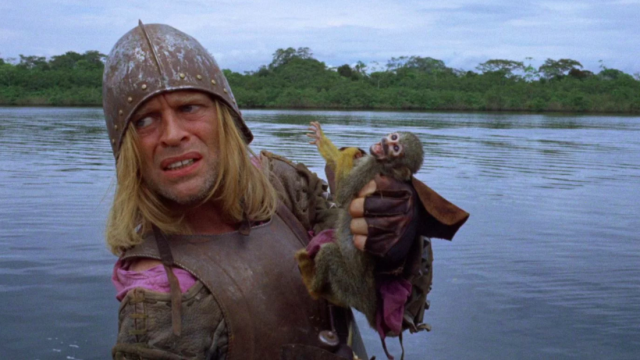I believe I first heard of Werner Herzog when Grizzly Man was getting buzz, but I never watched any of his movies. I only knew him as a living meme, the writer of existential Laffy Taffy jokes or the man who just happened to save Joaquin Phoenix’s life. But when I unexpectedly loved Apocalypse Now last year, I knew I wanted to check out its noted influence, Aguirre, the Wrath of God, especially because I had just seen it referenced in Me and Earl and the Dying Girl. Then I enjoyed Herzog on The Mandalorian, so that sealed the deal. I wanted to see what kind of a movie that Star Wars guy made.
From the opening scene, I could tell this film was low budget ($370,000, but that’s in 1972 dollars). The costumes looked so damn cheap, like people play-acting at being Spanish conquistadors in their backyard. If…their backyard was the Amazon. For the entire film, my mind boggled at what I was watching because there was no doubt they filmed this on location. Werner Herzog basically took the entire cast and crew on the same journey as the characters, trudging through the jungle and sailing down the river. Hell, at one point, the actual river flooded so Herzog simply incorporated that into the story. I loved the sound design of the film because the churning of the river sounded so real, as if I were hearing the recording unmixed and unedited. While I was watching one of Herzog’s most famous narrative features, it was very clear he was also a documentarian.
That documentarian sensibility kept me somewhat detached from the story and characters, however. Herzog presents a matter-of-fact POV during the film, but it’s more fascinating than it may appear because of the text prologue that informs the audience that the Incas made up the legend of El Dorado to tempt the Spanish conquistadors. Thus, we the audience know we’re watching the characters on a fools’ errand, and it makes everything they are doing so futile. Every time they crow about gold and El Dorado, we know it’s all a bunch of hooey, even if Herzog does nothing with the script or the camera to punctuate those moments. I appreciated this implicit commentary on colonialism, also present in the sight of these Spaniards enslaving the Indians to aid their quest. Inés does point out that where she comes from, servants are normally paid, one of the few times anyone offers explicit commentary on what the Spaniards are doing, but this one voice of reason eventually walks into the jungle and disappears.
Reason has no place in this film, of course, because its most compelling aspect is Aguirre’s descent into madness. It’s like Apocalypse Now if Kurtz were traveling down the river. Klaus Kinski puts on a very dour face (but not a dour voice, as he was dubbed), and he starts off very pessimistic and cynical about the river. He recognizes an upcoming Man vs. Nature conflict when he sees one, and he knows nature will most likely win. Interestingly, he doesn’t get a huge amount of focus early on, and if you didn’t know the title of the movie, you’d assume Ursúa, the commander of the expedition, was going to be the main character, not the man their boss chose to be second-in-command. Aguirre slowly seeds dissent, however, before leading a mutiny and installing a puppet commander, Guzmán, but once he has power, he must maintain it, especially since that puppet commander is so bold as to think for himself. After Guzmán is mysteriously strangled, however, Aguirre finally seizes the title of commander. When he detects an upcoming betrayal, he decapitates the man and then, in a wonderfully over-the-top monologue, declares that he is the great traitor and there can be no greater traitor, and it’s at that moment I caught another abstract connection to Apocalypse Now. Because you know who else was a great traitor? Fuckin’ SATAN. Yep, this movie is also a descent into hell itself, but instead of finding Satan at the center of the jungle, we’re following his journey, so it’s also a story of a man’s obsession with fame and glory. One that becomes so strong he will yell at a horse to get out of his way. (They eventually kick the horse off the boat. Poor horsie.)
And what an ending, huh? Herzog takes us on quite a journey only to end on Aguirre, emperor of the monkeys, raving about how he’s going to fuck his daughter, and it’s clear he’s truly gone off the deep end. The man who quite sensibly suggested that the river journey may be too dangerous to attempt is dead. It feels as if we’ve witnessed the origin story of the madman in the jungle, and he’s still out there, waiting for some Willard figure to come and find him.
Aguirre, the Wrath of God is a bit slow, and I wasn’t always engaged by its loose series of misadventures. But it’s epic in scope despite being only 94 minutes, and it’s full of great moments that make the experience linger. While I’m not quite sold on Werner Herzog as a filmmaker who speaks to me personally, I’m certainly a lot more intrigued by him now.


